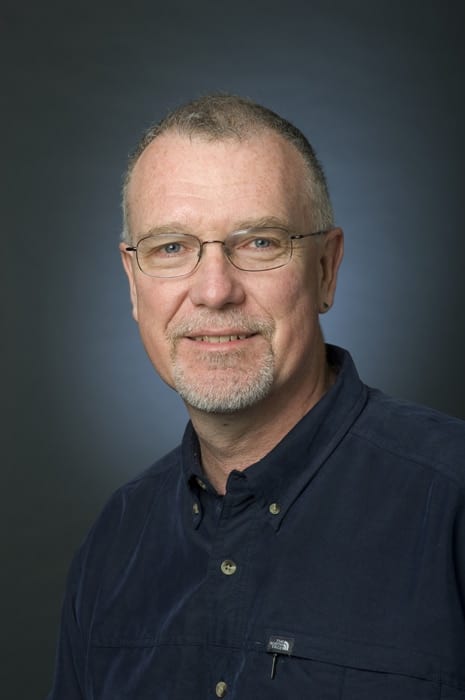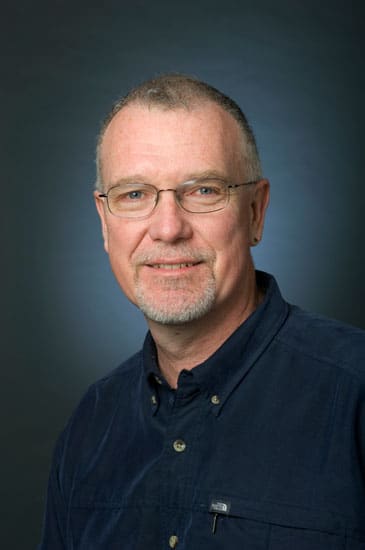Hal Caswell Receives First Per Brinck Oikos Award
 Hal Caswell, a senior scientist in the Biology Department, is well known for his work on population dynamics and demography. His recent research in this area has focused on developing models for studying threatened species, such as right whales, albatrosses, and polar bears. (Tom Kleindinst, Woods Hole Oceanographic Institution)
Hal Caswell, a senior scientist in the Biology Department, is well known for his work on population dynamics and demography. His recent research in this area has focused on developing models for studying threatened species, such as right whales, albatrosses, and polar bears. (Tom Kleindinst, Woods Hole Oceanographic Institution) April 1, 2008
The Per Brinck Foundation has selected biologist Hal Caswell of the Woods Hole Oceanographic Institution (WHOI), as the first recipient of the Per Brinck Oikos Award, which recognizes extraordinary and important contributions to the science of ecology.
Caswell, a senior scientist in the WHOI Department of Biology, is renowned for his work on population dynamics and demography. He received the award in February at the annual meeting in Lund, Sweden, of the Swedish Oikos Society – a society for ecologists with a professional interest in ecological research.
“Hal Caswell has revived ecological and evolutionary demography and showed how intimately ecological and evolutionary processes are linked together through stage-specific processes,” said Per Lundberg, editor of the journal Oikos. “We are very happy to have such a distinguished ecologist as the first awardee.”
Caswell builds theoretical models to explore the growth, extinction, invasion, and spatial patterns of animal populations. His work integrates observations of life cycle, vital rates, dispersal patterns, and other environmental variations over time and space to assess populations and how they might be conserved.
“The challenge in these areas is to acknowledge the richness and complexity of the life cycles of plants and animals,” said Caswell, “and to recognize the critical role of the environment, without becoming buried in the details.”
Caswell’s recent research has focused on developing models for studying the population dynamics and demography of threatened species, such as right whales, albatrosses, and polar bears.
In 2007, scientists from the U.S. Geological Survey turned to Caswell and colleague Christine Hunter of the University of Alaska to advise a team conducting an extensive study of Artic polar bears. Using new models and analysis, Caswell and Hunter found that the declining habitat of polar bears in the Artic is dramatically affecting survival, breeding, and population growth.
The U.S. Department of Interior recognized Caswell’s contribution to the international polar bear science team with a Unit Citation Award for Excellence of Service. Caswell also received the Ecological Research Award from the Ecological Society of Japan and the ISI Highly Cited Researcher in Ecology/Environment Award from Thomson Scientific in 2007.
Originally from California, Caswell was raised in Michigan. He earned all of his degrees at Michigan State University: a bachelor’s in zoology in 1971 and a doctorate in zoology in 1974. After seven years on the faculty at the University of Connecticut, Caswell came to WHOI in 1981. He is a fellow of WHOI’s Ocean Life Institute and of the American Academy of Arts and Sciences. Caswell has authored or co-authored over 150 papers, as well as several books on population dynamics and demography. He is a member of the Ecological Society of America, the British Ecological Society, and the American Association for the Advancement of Science.
The Per Brinck Oikos Award was created in 2007 in honor of the Swedish ecologist Per Brinck, a long-time editor of the journal Oikos. Brinck played an instrumental role in the development and recognition of ecology in Nordic countries. The award will be given annually to scientists whose work has lead to novel and original research in unexplored or neglected fields, or has bridged the gap between ecological disciplines.
The Woods Hole Oceanographic Institution is a private, independent organization in Falmouth, Mass., dedicated to marine research, engineering, and higher education. Established in 1930 on a recommendation from the National Academy of Sciences, its primary mission is to understand the oceans and their interaction with the Earth as a whole, and to communicate a basic understanding of the ocean’s role in the changing global environment.

